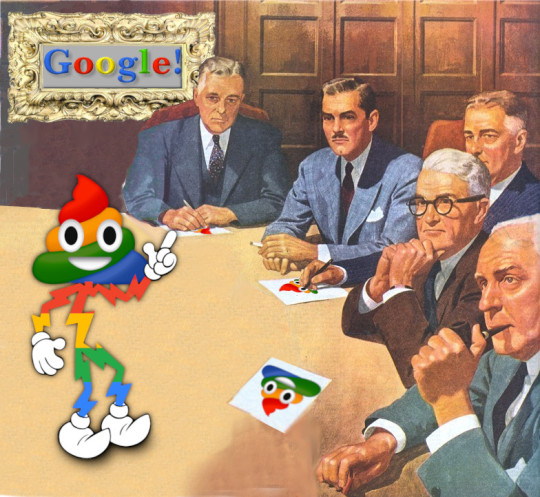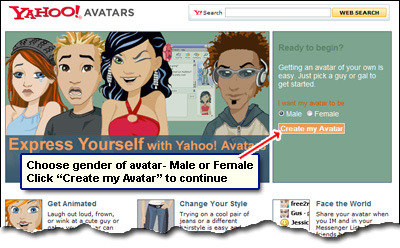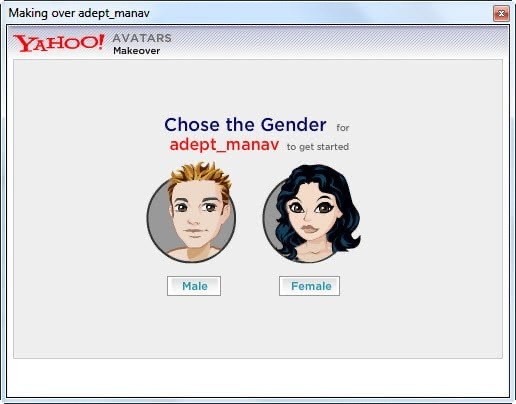#yahoo
Text
The specific process by which Google enshittified its search

I'm touring my new, nationally bestselling novel The Bezzle! Catch me SATURDAY (Apr 27) in MARIN COUNTY, then Winnipeg (May 2), Calgary (May 3), Vancouver (May 4), and beyond!

All digital businesses have the technical capacity to enshittify: the ability to change the underlying functions of the business from moment to moment and user to user, allowing for the rapid transfer of value between business customers, end users and shareholders:
https://pluralistic.net/2023/02/19/twiddler/
If you'd like an essay-formatted version of this thread to read or share, here's a link to it on pluralistic.net, my surveillance-free, ad-free, tracker-free blog:
https://pluralistic.net/2024/04/24/naming-names/#prabhakar-raghavan
Which raises an important question: why do companies enshittify at a specific moment, after refraining from enshittifying before? After all, a company always has the potential to benefit by treating its business customers and end users worse, by giving them a worse deal. If you charge more for your product and pay your suppliers less, that leaves more money on the table for your investors.
Of course, it's not that simple. While cheating, price-gouging, and degrading your product can produce gains, these tactics also threaten losses. You might lose customers to a rival, or get punished by a regulator, or face mass resignations from your employees who really believe in your product.
Companies choose not to enshittify their products…until they choose to do so. One theory to explain this is that companies are engaged in a process of continuous assessment, gathering data about their competitive risks, their regulators' mettle, their employees' boldness. When these assessments indicate that the conditions are favorable to enshittification, the CEO walks over to the big "enshittification" lever on the wall and yanks it all the way to MAX.
Some companies have certainly done this – and paid the price. Think of Myspace or Yahoo: companies that made themselves worse by reducing quality and gouging on price (be it measured in dollars or attention – that is, ads) before sinking into obscure senescence. These companies made a bet that they could get richer while getting worse, and they were wrong, and they lost out.
But this model doesn't explain the Great Enshittening, in which all the tech companies are enshittifying at the same time. Maybe all these companies are subscribing to the same business newsletter (or, more likely, buying advice from the same management consultancy) (cough McKinsey cough) that is a kind of industry-wide starter pistol for enshittification.
I think it's something else. I think the main job of a CEO is to show up for work every morning and yank on the enshittification lever as hard as you can, in hopes that you can eke out some incremental gains in your company's cost-basis and/or income by shifting value away from your suppliers and customers to yourself.
We get good digital services when the enshittification lever doesn't budge – when it is constrained: by competition, by regulation, by interoperable mods and hacks that undo enshittification (like alternative clients and ad-blockers) and by workers who have bargaining power thanks to a tight labor market or a powerful union:
https://pluralistic.net/2023/11/09/lead-me-not-into-temptation/#chamberlain
When Google ordered its staff to build a secret Chinese search engine that would censor search results and rat out dissidents to the Chinese secret police, googlers revolted and refused, and the project died:
https://en.wikipedia.org/wiki/Dragonfly_(search_engine)
When Google tried to win a US government contract to build AI for drones used to target and murder civilians far from the battlefield, googlers revolted and refused, and the project died:
https://www.nytimes.com/2018/06/01/technology/google-pentagon-project-maven.html
What's happened since – what's behind all the tech companies enshittifying all at once – is that tech worker power has been smashed, especially at Google, where 12,000 workers were fired just months after a $80b stock buyback that would have paid their wages for the next 27 years. Likewise, competition has receded from tech bosses' worries, thanks to lax antitrust enforcement that saw most credible competitors merged into behemoths, or neutralized with predatory pricing schemes. Lax enforcement of other policies – privacy, labor and consumer protection – loosened up the enshittification lever even more. And the expansion of IP rights, which criminalize most kinds of reverse engineering and aftermarket modification, means that interoperability no longer applies friction to the enshittification lever.
Now that every tech boss has an enshittification lever that moves very freely, they can show up for work, yank the enshittification lever, and it goes all the way to MAX. When googlers protested the company's complicity in the genocide in Gaza, Google didn't kill the project – it mass-fired the workers:
https://medium.com/@notechforapartheid/statement-from-google-workers-with-the-no-tech-for-apartheid-campaign-on-googles-indiscriminate-28ba4c9b7ce8
Enshittification is a macroeconomic phenomenon, determined by the regulatory environment for competition, privacy, labor, consumer protection and IP. But enshittification is also a microeconomic phenomenon, the result of innumerable boardroom and product-planning fights within companies in which would-be enshittifiers try to do things that make the company's products and services shittier wrestle with rivals who want to keep things as they are, or make them better, whether out of principle or fear of the consequences.
Those microeconomic wrestling-matches are where we find enshittification's heroes and villains – the people who fight for the user or stand up for a fair deal, versus the people who want to cheat and wreck to make things better for the company and win bonuses and promotions for themselves:
https://locusmag.com/2023/11/commentary-by-cory-doctorow-dont-be-evil/
These microeconomic struggles are usually obscure, because companies are secretive institutions and our glimpses into their deliberations are normally limited to the odd leaked memo, whistleblower tell-all, or spectacular worker revolt. But when a company gets dragged into court, a new window opens into the company's internal operations. That's especially true when the plaintiff is the US government.
Which brings me back to Google, the poster-child for enshittification, a company that revolutionized the internet a quarter of a century ago with a search-engine that was so good that it felt like magic, which has decayed so badly and so rapidly that whole sections of the internet are disappearing from view for the 90% of users who rely on the search engine as their gateway to the internet.
Google is being sued by the DOJ's Antitrust Division, and that means we are getting a very deep look into the company, as its internal emails and memos come to light:
https://pluralistic.net/2023/10/03/not-feeling-lucky/#fundamental-laws-of-economics
Google is a tech company, and tech companies have literary cultures – they run on email and other forms of written communication, even for casual speech, which is more likely to take place in a chat program than at a water-cooler. This means that tech companies have giant databases full of confessions to every crime they've ever committed:
https://pluralistic.net/2023/09/03/big-tech-cant-stop-telling-on-itself/
Large pieces of Google's database-of-crimes are now on display – so much, in fact, that it's hard for anyone to parse through it all and understand what it means. But some people are trying, and coming up with gold. One of those successful prospectors is Ed Zitron, who has produced a staggering account of the precise moment at which Google search tipped over into enshittification, which names the executives at the very heart of the rot:
https://www.wheresyoured.at/the-men-who-killed-google/
Zitron tells the story of a boardroom struggle over search quality, in which Ben Gomes – a long-tenured googler who helped define the company during its best years – lost a fight with Prabhakar Raghavan, a computer scientist turned manager whose tactic for increasing the number of search queries (and thus the number of ads the company could show to searchers) was to decrease the quality of search. That way, searchers would have to spend more time on Google before they found what they were looking for.
Zitron contrasts the background of these two figures. Gomes, the hero, worked at Google for 19 years, solving fantastically hard technical scaling problems and eventually becoming the company's "search czar." Raghavan, the villain, "failed upwards" through his career, including a stint as Yahoo's head of search from 2005-12, a presiding over the collapse of Yahoo's search business. Under Raghavan's leadership, Yahoo's search market-share fell from 30.4% to 14%, and in the end, Yahoo jettisoned its search altogether and replaced it with Bing.
For Zitron, the memos show how Raghavan engineered the ouster of Gomes, with help from the company CEO, the ex-McKinseyite Sundar Pichai. It was a triumph for enshittification, a deliberate decision to make the product worse in order to make it more profitable, under the (correct) belief that the company's exclusivity deals to provide search everywhere from Iphones and Samsungs to Mozilla would mean that the business would face no consequences for doing so.
It a picture of a company that isn't just too big to fail – it's (as FTC Chair Lina Khan put it on The Daily Show) too big to care:
https://www.youtube.com/watch?v=oaDTiWaYfcM
Zitron's done excellent sleuthing through the court exhibits here, and his writeup is incandescently brilliant. But there's one point I quibble with him on. Zitron writes that "It’s because the people running the tech industry are no longer those that built it."
I think that gets it backwards. I think that there were always enshittifiers in the C-suites of these companies. When Page and Brin brought in the war criminal Eric Schmidt to run the company, he surely started every day with a ritual, ferocious tug at that enshittification lever. The difference wasn't who was in the C-suite – the difference was how freely the lever moved.
On Saturday, I wrote:
The platforms used to treat us well and now treat us badly. That's not because they were setting a patient trap, luring us in with good treatment in the expectation of locking us in and turning on us. Tech bosses do not have the executive function to lie in wait for years and years.
https://pluralistic.net/2024/04/22/kargo-kult-kaptialism/#dont-buy-it
Someone on Hacker News called that "silly," adding that "tech bosses do in fact have the executive function to lie in wait for years and years. That's literally the business model of most startups":
https://news.ycombinator.com/item?id=40114339
That's not quite right, though. The business-model of the startup is to yank on the enshittification lever every day. Tech bosses don't lie in wait for the perfect moment to claw away all the value from their employees, users, business customers, and suppliers – they're always trying to get that value. It's only when they become too big to care that they succeed. That's the definition of being too big to care.
In antitrust circles, they sometimes say that "the process is the punishment." No matter what happens to the DOJ's case against Google, its internal workers have been made visible to the public. The secrecy surrounding the Google trial when it was underway meant that a lot of this stuff flew under the radar when it first appeared. But as Zitron's work shows, there is plenty of treasure to be found in that trove of documents that is now permanently in the public domain.
When future scholars study the enshittocene, they will look to accounts like Zitron's to mark the turning points from the old, good internet to the enshitternet. Let's hope those future scholars have a new, good internet on which to publish their findings.

If you'd like an essay-formatted version of this post to read or share, here's a link to it on pluralistic.net, my surveillance-free, ad-free, tracker-free blog:
https://pluralistic.net/2024/04/24/naming-names/#prabhakar-raghavan
#pluralistic#ed zitron#google#microincentives#constraints#enshittification#rot economy#platform decay#search#ben gomes#code yellow#mckinsey#hacking engagement#Prabhakar Raghavan#yahoo#doj#antitrust#trustbusting
228 notes
·
View notes
Text
(Speaks directly into your brain like Loop) listen to Don McLean
#yahoo#my art#siffrin#siffrin isat#isat#isat siffrin#animatic#isat animatic#in stars and time#siffrin in stars and time#loop isat#isat loop#loop in stars and time#isat spoilers#in stars and time spoilers#isat fanart#in stars and time fanart#siffrin fanart#loop fanart#isat change god#change god#the change god#the change god in stars and time#isat euphrasie#euphrasie isat#euphrasie in stars and time
162 notes
·
View notes
Text

cool fish a scientist found while diving




#one piece#kobylu#cobylu#monkey d luffy#coby one piece#koby one piece#jellyfish luffy au#that also mainly features kobylu.#yahoo
42 notes
·
View notes
Text
YALL WE SUCCESSFULLY BULLIED THE RICH INTO BACKPEDALLING

#watcher entertainment#watcher#shane madej#ryan bergara#steven lim#holy shiiiiiiit#we did it#yahoo#holy fuck#fandom#hi tumblr
29 notes
·
View notes
Text

Pinning Kings.
#digital art#art#painting#gaming#fanart#ace attorney#original art#phoenix wright#miles edgeworth#narumitsu#wrightworth#gay#yey#yipeeee#yahoo
4K notes
·
View notes
Text

the last ones standing
#YAHOO#grian#zombiecleo#smajor1995#scott smajor#samgatinho#warm bloods my favourites#secret life spoilers#secret life smp
2K notes
·
View notes
Text






Hermit-a-day
Week 3: zedaph, impulse, beef, grian, keralis, hypno
#yahoo#just a little late but oh well#last two were giving me trouble#hermitaday#hermitcraft#hermitcraft s9#zedaphplays#impulsesv#vintagebeef#grian#keralis#hypnotized#my art
3K notes
·
View notes
Text










Yahoo Avatars (2004 - 2013)
#yahoo avatars#yahoo#yahoo!#2004#2005#2006#2007#2008#2009#y2k#2000s#2000s nostalgia#2000s kids#2000s style#y2k nostalgia#00s#y2k aesthetic#y2k style#2000s kid#aol#00s kid#y2kcore#00’s#00score#00s core#2000#00s aesthetic#2000s fashion
911 notes
·
View notes
Text

I think this would be them
767 notes
·
View notes
Text
I got taken to bad child clown school and when I came back my high school had been taken over by Yahoo. It was still a normal high school, just, Yahoo brand high school. Also, it was bright blue.
577 notes
·
View notes
Text

Ignore the arm ignore the left arm ignore it ignore it ignore it I spent an entire day on it and now I am deciding to leave it in my dark twisted past DONT LOOK AT IT


jon kind of closeup + Martin unclouded yay
#cosm's art!!!!!#the magnus archive fanart#tma fanart#jonathan sims#magnuspod#martin blackwood#jmart#the magnus archives#this is one of those drawings where#You think of a concept and then you're like hmmm I'm not skilled enough to execute it#But then I was like I've lost way too many ideas to that way of thinking so I decided to do it anyway#It didn't really come out how I wanted but that's okay! At least I tried#YAHOO#yippee#we win
289 notes
·
View notes
Text

happy 1 year anniversary to pnf427!!!
#tsp#the stanley parable#tspud#stanley tsp#tsp narrator#stanarrator#stanley x narrator#my art#YAHOO#one year ago today i made this blog#thank you to everyone who i met through tsp
976 notes
·
View notes
Text
someday i’ll go grocery shopping with you. someday we’ll do laundry together. someday i’ll make you breakfast and pack you a lunch for the work day. someday instead of texting you goodnight i will kiss your forehead and whisper it to you instead
#gay#finn rambles#i love my boyfriend#its my birthday also !!#yahoo#mlm yearning#mlm thoughts#mlm#t4t sfw#mlm sfw#mlm love#gay yearning#achillean#queerplatonic#qpr#alterous
310 notes
·
View notes
Text



Shiny Dratini in Soulsilver!!
I played a lot of Voltorb Flip to afford all those Dratini
#YAHOO#YIPPEE#HOORAY!!#and on Lunar New Year!#pokemon#pkmn#pokemon heartgold and soulsilver#shiny pokemon#shiny hunt#Dratini
168 notes
·
View notes
Text
YAHOO CHICKEN ARMY FOR CHARITY


ON TWITCH.TV/AIMSEY
312 notes
·
View notes
Text

headache
#HI YEAH I MAY HAVE DRAWN HIM AGAIN#uh#yahoo#zedaph#zedaph fanart#impulsesv#impulsesv fanart#hermit archives#cw eyestrain#cw body horror#my art
3K notes
·
View notes